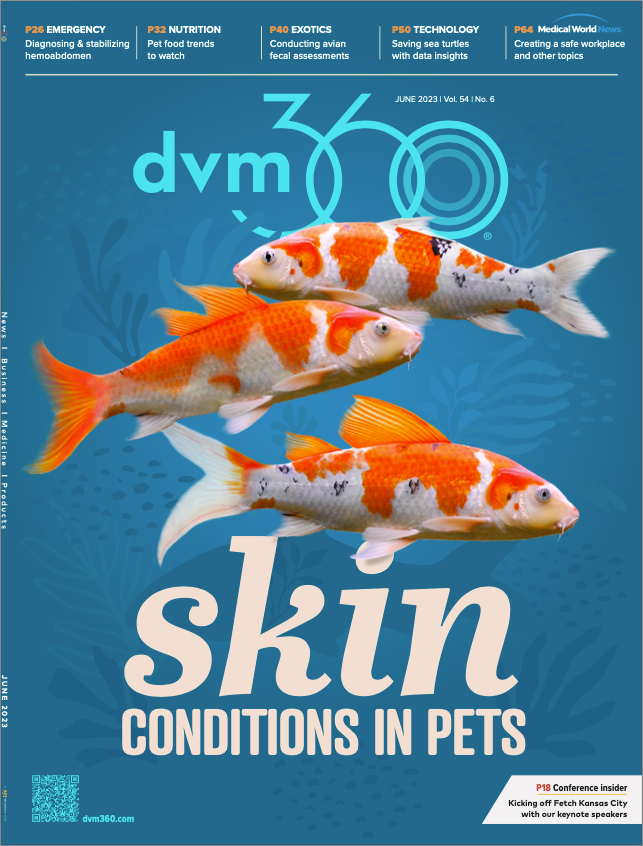Renal transplants in cats
The process of pursuing kidney transplant is arduous and thorough to ensure success for the recipient and donor
steevy84 / stock.adobe.com

The management and prognosis of an irreversible acute kidney injury or severe chronic kidney disease can be challenging, complicated, and disappointing. For cats, renal transplants serve as an option to restore kidney function, particularly with an insult that has rendered them completely dependent on dialysis. Renal transplants have a 77% survival rate in cats and a median survival time of up to 613 days,1,2 with almost half of patients surviving 3 years or more after surgery.3
Renal transplants are performed at very few institutions, including the University of Pennsylvania and the University of Georgia. The process to pursue kidney transplant is arduous and thorough to ensure success for both the recipient and the donor.
Indications
The most commonly encountered indication for a renal transplant is chronic interstitial nephritis.4 Other indications include toxicities such as lilies and ethylene glycol. Renal transplants have also been performed in cats for polycystic kidney disease, pyelonephritis, renal dysplasia, and amyloidosis.4 In the case of irreversible acute kidney injury secondary to a toxin, patients often need stabilization prior to proceeding with a transplant. This stabilization can be in the form of hospitalization with administration of intravenous fluids or may require several treatments with hemodialysis. It is important to note that a previous diagnosis of uroliths for the recipient is not a contraindication and has not been shown to affect outcome following transplant.5
Preoperative assessment
The preoperative screening for a potential transplant patient is extensive. A complete blood cell count, chemistry panel, and thyroid screening must be performed, in addition to feline leukemia virus and feline immunodeficiency virus testing and Toxoplasma gondii titers. A urinalysis and urine culture are essential prior to surgery, and a full cardiac assessment including radiographs, blood pressure, an electrocardiogram, and an echocardiogram is needed. An abdominal ultrasound is needed to screen for other abdominal diseases that may preclude the patient from moving forward with a transplant. A blood test is performed, as well as major and minor crossmatches. It is strongly recommended to contact the transplant surgeon prior to moving forward with completing any of the preoperative screening in a general practice, as they may have more specific input than can be found here.
Client counseling
Given the time, emotional, and financial commitment required of the client and clinician, appropriate client counseling is imperative. It is important to remember that this is an exchange of one chronic disease for another. Although most medications associated with chronic kidney disease can be discontinued following transplant, patients will need to be on lifelong immunosuppressive therapies. Clients must be prepared not only for the financial implications of the screening and the surgery but also the potential of rejection in both acute and long-term settings. Additionally, clients must be prepared for the time and financial investment associated with lifelong follow-ups, diagnostics, and potential complications. It is recommended that clients identify a general practice veterinarian and a 24/7 emergency department in the event that a problem occurs after leaving the transplant facility. Also, most transplant programs require that the recipient’s owners adopt the donor as well, so pet owners must be prepared to bring another cat into their household, as well as take on the associated costs that come with a new addition.
Postoperative care and complications
The vast majority of transplant recipients remain in the hospital for 3 to 7 days following surgery. During this time, their kidney values, electrolytes, weight, and appetite are closely monitored. Although most patients are discharged with a feeding tube, many begin eating shortly after surgery. Cyclosporine levels are monitored closely while the patient is in the hospital and often need adjustment as the patient’s appetite changes.
Following discharge, the patient will still require serial blood work and potentially cyclosporine levels monitoring, even if no complications occur. In some institutions, patients may be disqualified based on a seropositive test for T gondii; however, some literature suggests that is not necessary.6 Even if a patient is seronegative preoperatively, follow-up titers may be recommended, and those that are positive will need to remain on lifelong clindamycin in addition to their immunosuppressives. Veterinarians will need to remain alert to the possibility of a T gondii infection for the life of the patient and act swiftly if there is suspicion. The appropriate diagnostic tests and schedule should be discussed with the transplant surgeon.
Several potential complications may occur in the early postoperative and late postoperative periods that the veterinarian must be aware of. Rejection may be acute or chronic and occurs in anywhere from 13% to 26% of feline patients in the acute setting.1,2 Prompt recognition of rejection and contact with the transplant surgeon is vital to preserve function of the organ. Other complications that can be seen include diabetes mellitus, retroperitoneal fibrosis leading to a ureteral obstruction, and neoplasia.7,8
Rachel Williams, DVM, DACVS-SA, is a clinical assistant professor of small animal surgery at the University of Florida. Her professional interests include urogenital surgery and minimally invasive surgery as well as wounds and reconstruction. Outside the operating room, she enjoys being outdoors with her dogs, gardening, and traveling.
References
- Schmiedt CW, Holzman G, Schwarz T, McAnulty JF. Survival, complications, and analysis of risk factors after renal transplantation in cats. Vet Surg. 2008;37(7):683- 695. doi:10.1111/j.1532-950X.2008.00435.x
- MathewsKG,GregoryCR.Renaltransplantsincats:66cases (1987-1996). J Am Vet Med Assoc. 1997;211(11):1432-1436.
- Adin CA, Gregory CR, Kyles AE, Cowgill L. Diagnostic predic- tors of complications and survival after renal transplantation in cats. Vet Surg. 2004;30(6):515-521. doi:10.1053/jvet.2001.28418
- Aronson L, Phillips H. Renal transplant. In: Johnston SA, Tobias KM, eds. Veterinary Surgery: Small Animal Expert Consult. 2nd ed. Elsevier; 2017.
- Aronson LR, Kyles AE, Preston A, Drobatz KJ, Gregory CR. Renal transplantation in cats with calcium oxalate urolithiasis: 19 cases (1997-2004). J Am Vet Med Assoc. 2006;228(5):743-749. doi:10.2460/javma.228.5.743
- Ludwig HC, Schlicksup MD, Beale LM, Aronson LR. Toxoplasma gondii infection in feline renal transplant recipients: 24 cases (1998-2018). J Am Vet Med Assoc. 2021;258(8):870-876. doi:10.2460/javma.258.8.870
- Schmiedt CW, Grimes JA, Holzman G, McAnulty JF. Incidence and risk factors for development of malignant neoplasia after feline renal transplantation and cyclosporine-based immunosuppression. Vet Comp Oncol. 2009;7(1):45-53. doi:10.1111/j.1476-5829.2008.00172.x
- Case JB, Kyles AE, Nelson RW, et al. Incidence of and risk factors for diabetes mellitus in cats that have under- gone renal transplantation: 187 cases (1986-2005). J Am Vet Med Assoc. 2007;230(6):880-884. doi:10.2460/ javma.230.6.880
